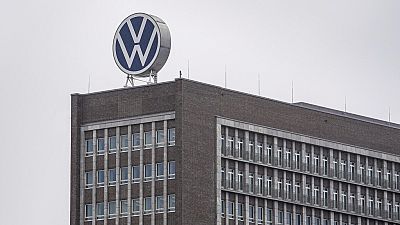Nvidia shares suffered their largest one-day drop ever amidst the artificial intelligence (AI) stock sell-off. The company is also facing an antitrust investigation due to concerns over its dominance in AI chip supplies.
Shares of the artificial intelligence (AI) darling, Nvidia, experienced their worst single-day drop, falling by more than 9% on Tuesday as investors continued to retreat from AI stocks.
The company's share price fell further, dropping an additional 2% in extended trading, resulting in a total loss of nearly $300bn (€272bn) in market capitalisation. This followed news that the company had received a subpoena from the US Department of Justice (DOJ) on an antitrust investigation.
Concerns over antitrust breaches
According to a Bloomberg report released after US markets closed on Tuesday, the US Department of Justice (DOJ) issued subpoenas to Nvidia and other companies seeking evidence of antitrust violations.
DOJ officials are concerned that the chip maker's dominance in the global AI chip market leaves customers with limited options, making it difficult for them to switch to other market players if they do not exclusively use Nvidia's products.
The probe marks an escalation of an antitrust investigation that began in June when the US initiated an inquiry into both Microsoft and Nvidia.
These tech giants have been the primary beneficiaries of the AI boom since 2023, following Microsoft's launch of the AI-powered chatbot, ChatGPT, in February last year. Nvidia is the leading supplier of AI chips, specifically its Graphics Processing Units (GPUs), which are essential for hyperscalers supporting Large Language Model (LLM) training.
Despite the recent decline, Nvidia shares remain up by 146% this year, making it the best performer among global technology stocks.
However, the company reported disappointing quarterly earnings last week, signalling that Nvidia's period of explosive growth, which began in the second quarter of fiscal year 2024, may be slowing down. This led to a 7% drop in its shares on that day.
Tuesday's sell-off suggests that investors are continuing to offload AI stocks amid signs of a deteriorating economy, reflecting a broader trend in global markets.
Risk-off sentiment prevails across global markets
The Nvidia-led market rout was also attributed to worsening sentiment over concerns about the broader macroeconomic backdrop.
Risk aversion dominated global market movements on Tuesday, with major European benchmarks ending in the red, while US indices tumbled as the month began.
The pan-European Stoxx 600 index fell by 1%, the S&P 500 declined by 2%, and the tech-heavy Nasdaq dropped by more than 3%. The selloff was particularly pronounced in semiconductor stocks, as Nvidia's slump rippled through global markets, with European chip equipment manufacturer ASML losing more than 4%.
US economic data disappoints
On Tuesday morning, the US reported disappointing economic data, revealing that manufacturing activities contracted for the fourth consecutive month in August, reigniting recession fears in the world's largest economy.
Wall Street experienced its worst one-day sell-off since the start of August, amidst global turmoil driven by the Bank of Japan's rate hike and mounting economic concerns.
Investors appear to be increasingly sensitive to economic indicators following the early August selloffs, as the Federal Reserve (Fed) is expected to begin lowering interest rates this month.
A potential deeper cut could signal rapidly deteriorating economic conditions. Historically, an economic recession has always occurred during a Fed rate-cutting cycle.
Most other major central banks have already commenced their rate reductions amid slowing economic growth and easing inflation.
The European Central Bank is also scheduled to make a decision on interest rates later this month, with market participants widely expecting the bank to deliver its second 25 basis point rate cut of the year.















